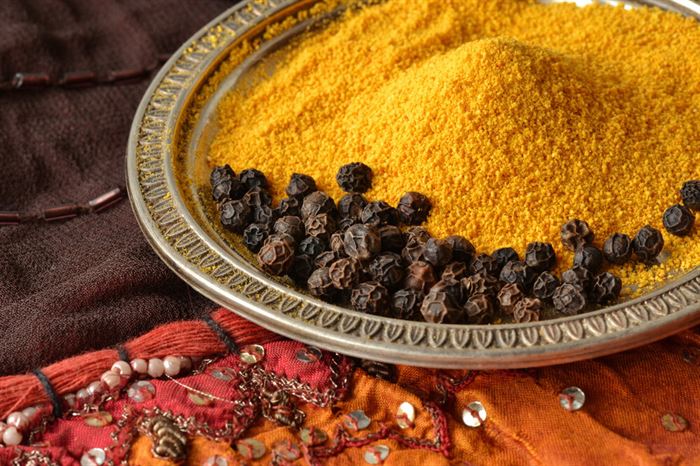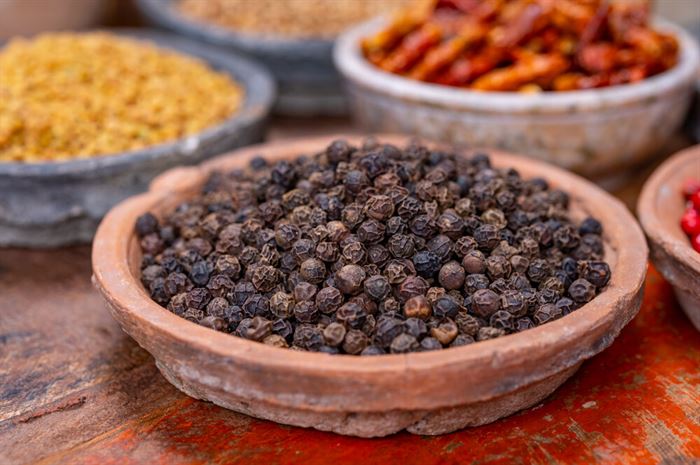Black pepper, often dubbed the ‘king of spices’, graces tables and kitchens worldwide, adding zest to dishes across cultures. Its pungent aroma and distinctive flavor have made it a favorite among chefs and food enthusiasts. However, the allure of this spice goes beyond global cuisines. Delving into the heart of India, we uncover a rich tapestry of traditions where “Black Pepper in Hindi” customs holds a unique and revered spot. Join us as we explore this intriguing journey of a humble spice in the Hindi heartland.

Contents
The Historical Significance of Black Pepper in Hindi Culture
Early Mentions in Ancient Texts
Delving into the annals of history, the references to this coveted spice, often termed “maricha” in ancient Sanskrit scriptures, are profound. These early mentions not only highlight its culinary use but also its medicinal properties.
Trade and Its Spread Across Ancient India
The trade routes of yesteryears were abuzz with the exchange of spices, with black pepper being a prized possession. As merchants traveled, the popularity of this spice grew, solidifying its place in the gastronomy of various regions within the Indian subcontinent.
Symbolism in Festivals and Rituals
Beyond its culinary and economic value, black pepper holds symbolic significance in Hindi traditions. Integral to numerous festivals and rituals, it’s seen as a symbol of purity, prosperity, and health. Whether offered to deities or used in traditional ceremonies, its presence is felt deeply in the cultural fabric of the Hindi heartland.

Black Pepper Ayurveda Uses
Understanding Ayurveda in Hindi Health Traditions
Ayurveda, often referred to as the ‘science of life’, holds a pivotal role in the health practices of the Hindi populace. This ancient system of medicine, deeply rooted in Indian traditions, emphasizes balance and holistic wellness. Black pepper, or what’s locally known as “maricha,” finds its rightful place in this venerable system.
The ‘Rasa’, ‘Virya’, and ‘Vipaka’ of Black Pepper
In Ayurvedic parlance, every ingredient is characterized by its Rasa (taste), Virya (energy), and Vipaka (post-digestive effect). The piquant spice, black pepper, possesses a sharp ‘Rasa’, a heating ‘Virya’, and a pungent ‘Vipaka’, making it a catalyst in balancing bodily doshas.
Health Benefits: A Panacea of Wellness
- Digestion and Metabolism: One of the standout attributes of this aromatic spice is its ability to stimulate the digestive fire, aiding in efficient metabolism and nutrient absorption.
- Respiratory Relief: Traditionally, the spice has been an ally in combating respiratory issues, proving effective in alleviating symptoms of coughs and colds.
- Anti-inflammatory Properties: Its compounds, especially piperine, render it potent anti-inflammatory effects, offering relief in various inflammatory conditions.
- Detoxification and Rejuvenation: In the realm of Ayurveda, black pepper is hailed for its detoxifying properties, purifying the system and rejuvenating the body from within.
The multifaceted benefits of this humble spice in Ayurvedic practices underline its esteemed position in Hindi health traditions.

Hindi Recipes with Black Pepper
Culinary Significance in Hindi Cuisine
The pungent kick of black pepper, locally known as “kali mirch,” has been a staple in Hindi kitchens for centuries. Its versatility not only amplifies the taste but also introduces a myriad of health benefits, making it a cherished ingredient in numerous traditional dishes.
Recipe 1: Black Pepper and Cumin Rice
- Ingredients:
- 1 cup basmati rice
- 2 tsp black pepper (coarsely ground)
- 1 tsp cumin seeds
- 2 tbsp ghee or oil
- Salt to taste
- Water
- Method:
- Heat ghee in a pan and sauté cumin seeds until they splutter.
- Add the coarsely ground black pepper and rice. Stir for a few minutes.
- Add water, salt, and cook until the rice is tender.
- Health Benefits: The combination of cumin and black pepper aids digestion and is believed to help in detoxification.

Recipe 2: Black Pepper-infused Lentil Soup
- Ingredients:
- 1 cup lentils (washed)
- 2 tsp black pepper (crushed)
- 1 onion (chopped)
- 2 tomatoes (pureed)
- 1 tsp turmeric powder
- Salt to taste
- Water
- Method:
- In a pot, add lentils, water, turmeric, and salt. Cook until lentils are soft.
- In another pan, sauté onions. Once translucent, add tomato puree and black pepper.
- Mix the sautéed mixture into the lentils, simmer for 10 minutes.
- Health Benefits: This soup is rich in protein and fiber, and the addition of black pepper enhances nutrient absorption.
Incorporating Black Pepper in Daily Meals
Pepper’s intrinsic warmth and aroma can be subtly introduced into daily meals. Whether it’s sprinkled over fresh salads, fused into gravies, or mixed in beverages like ‘golden milk’, its presence can elevate both taste and health benefits.

Modern-day Relevance of Black Pepper in Hindi Traditions
Continued Cultural Significance
Even today, the allure of “kali mirch” remains unwavering in the Hindi heartland. While its roots trace back to ancient traditions, black pepper continues to be a symbol of prosperity and health in many households, often incorporated in rituals and festive ceremonies.
Supported by Modern Research
Science and traditional wisdom converge when it comes to the myriad benefits of this pungent spice. Contemporary studies echo what Ayurveda has championed for centuries—its role in enhancing digestion, combating inflammation, and promoting overall wellness.
A Staple in Modern and Fusion Dishes
In today’s culinary landscape, the versatility of black pepper shines. Not restricted to traditional dishes, it finds its way into avant-garde recipes and fusion cuisines. Whether it’s a pepper-infused cocktail or a contemporary dessert with a peppery twist, the spice adds depth and an edge, making it indispensable in the modern Hindi kitchen.

Conclusion
The journey of “kali mirch” through the tapestry of Hindi traditions is both rich and enlightening. From its revered place in ancient texts to its undeniable health advantages, its multifaceted benefits are evident. Embracing this spice in daily culinary adventures not only tantalizes the taste buds but also fosters well-being. Here’s to sprinkling a dash of tradition and health in our lives!


